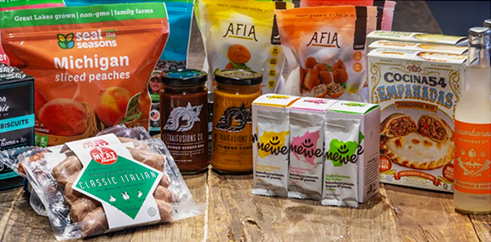The new class of the yogurt company’s incubator shows how it’s helping the kind of founders that often have a hard time securing funding.
Nearly everything about Edesia Nutrition is different than the stereotypical consumer packaged food companies that draw investment. For one thing, it’s not located in New York or the Bay Area but rather Rhode Island. For another, founder Navyn Salem is a woman in typically male-heavy industry. Edesia isn’t even a for-profit company: It’s a nonprofit manufacturer of the fortified, peanut butter-based, ready-to-use-therapeutic food called Plumpy’Nut, which international aid groups like UNICEF, World Food Programme, and USAID distribute to counter malnutrition in the developing world.
Not surprisingly, Salem thinks differently too: For instance, while many nonprofits rely on grants, she recently launched MeWe, a commercial line of squeezable, easy-to-swallow nut butters aimed at introducing U.S. infants to those ingredients at an earlier age. That may reduce their risk of allergic reactions later on. On factory side, Salem employs immigrants and refugees from at least 25 countries who might otherwise have trouble finding work.
It’s exactly those sorts of differences that helped Edesia become one of eight groups just invited to join Chobani’s semi-annual business incubator program, which focuses on helping CPG and beverage companies grow their often healthier, more transparent, and socially minded concepts into a larger market force. Starting in April, Chobani’s Spring 2019 program will offers three representatives from each company four weeks of master classes and brand auditing at Chobani’s SoHo office in New York City, along with $25,000 in equity-free funding.
For Chobani, this year’s class is intentionally made of the kind of founders that are typically underrepresented in the food and venture capital worlds alike. Minority founders account for 75% of the grant recipients, and 63% of the award winners are also women. After several Chobani executives traveled to different cities to encourage entrepreneurs around the U.S. to apply, the incubator’s participants ended up geographically diverse. Founders hail from seven different states: North Carolina, South Carolina, Texas, Washington, New York, Washington, D.C., and Rhode Island.
The companies include mediterranean-inspired Afia Foods, an Austin-based company whose founder Farrah Moussallati makes frozen falafel and kibbeh from Halal-certified meat, and employs some family members who are Syrian refugees. At Mason Dixie Biscuit Co. in Washington, D.C., founder Ayeshah Abuelhiga sells preservative- and additive-free biscuits, and has expanded through a female-owned co-manufacturer. (Here’s the entire list of participants.)
Chobani’s current incubator director Zoe Feldman joined the company in October 2018, after stints at PepsiCo and in venture funding. For Feldman, who is gay, choosing companies largely led by underrepresented founders (or people in underappreciated places) is part of a mission that feels both personal and practical. Women and minorities are historically overlooked for VC funding.
The idea was embraced by Chobani CEO Hamdi Ulukaya, who is both an immigrant and refugee, and has worked hard to incorporate opportunities for inclusion into the yogurt company’s own business practices. Feldman also worked to provide opportunities to founders who self-identified as gay or having served in the military. In many cases, the companies Chobani is backing represent early success despite being overlooked by traditional investors. For Feldman, that bootstrap mentality seemed especially irresistible. “If people really could do a lot with very little, I want those people in this program,” she adds.
This is the incubator’s fifth class since the concept started in the fall of 2016. Since that time, minority and female participation has fluctuated. In the last incubator class before Feldman took over, only 33% of the founders were minorities. Women fared better but not great at 50% of participants. At that time, five of the six companies chosen hailed from the New York area; the other was from Chicago.
Chobani’s own audit of its first two incubator classes, which happened in the fall of 2016 and fall of 2017, shows the format is working. In 2018, those former alumni reported an average 68% increase in their distribution rate, and 67% more revenue than the year before. Since the program’s inception, all of its incubator participants graduated to raise a combined $60 million in additional investment.


Navyn Salem was told over and over that with no previous relevant experience she’d never succeed. Her vision was to build a factory to manufacture…